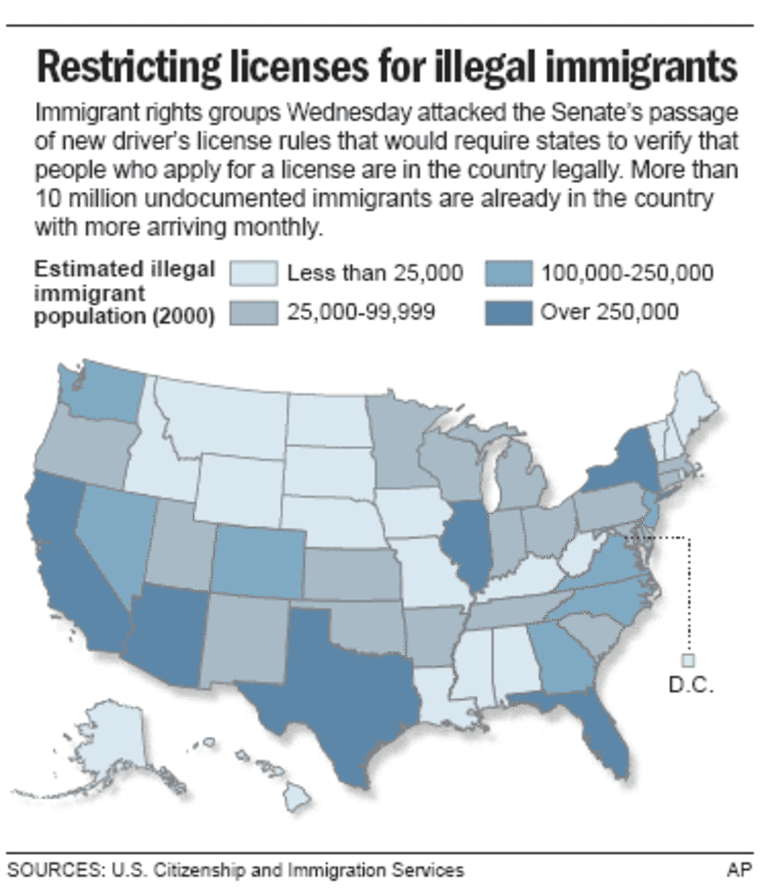Immigrant rights groups on Wednesday attacked the passage of new driver’s license rules aimed at preventing terrorism, saying they won’t secure the nation and reflect surging hostility toward the foreign-born in the United States.
“This is clearly an anti-immigrant bill that’s going to have a very harmful impact on the Latino community and all immigrant communities,” said Michele Waslin, director of immigration policy research at the National Council of La Raza.
“It doesn’t make us one iota safer. Not a single immigrant is going to be returned to his or her home country if they’re denied a driver’s license.”
The REAL ID Act requires states to verify that people who apply for a driver’s license are in the country legally. It also makes it harder for immigrants to gain amnesty, and easier to override environmental laws to build a barrier along the Mexican border in California.
The provision was folded into an emergency military spending bill that earmarks $82 billion for the war in Iraq. It was approved by the House last week and the Senate on Tuesday. President Bush signed the measure Wednesday.
For some, post-9/11 xenophobia
Immigrants’ advocates say the legislation is the latest example of the nation’s increasingly hostile climate toward foreign-born residents, an atmosphere dramatically worsened by the terrorist attacks of Sept. 11, 2001, and continually fueled by the ongoing war in Iraq.
“America is a country of paradoxes: We are a country of immigrants, yet we attack immigrants,” said Wade Henderson, president of the Leadership Council on Civil Rights, a coalition in Washington that in March sent a petition — signed by 64 member organizations — calling on legislators to vote against the act.
“The REAL ID Act is the most blatant attack on immigrant rights since the last major overhaul of immigration law in 1996,” he said.
Rep. James Sensenbrenner, R-Wis., the lead author of the bill, lauded its passage.
“The REAL ID is vital to preventing foreign terrorists from hiding in plain sight while conducting their operations and planning attacks,” he said in a statement. “By targeting terrorist travel, the REAL ID will assist in our war on terror efforts.”

For others, sign of pressing need
Henderson and other advocates said the more than 10 million undocumented immigrants already in the country — with more arriving monthly — demonstrate the pressing need for comprehensive immigration reform. Such changes are being drafted by several senators and are expected to include a proposed guest worker program that would allow immigrants already in the United States to work legally.
Opponents of REAL ID also complained that the immigration provisions were combined with an emergency measure for military spending, forcing a rushed vote with no Senate hearings amid heavy political pressure.
“This wasn’t vetted, and it was attached to this political must-pass bill,” said Christine Gleichert, legislative director for the American-Arab Anti-Discrimination Committee.
All but one of the 19 hijackers in the Sept. 11 attacks had some form of U.S. identification, some of it fraudulent, the Sept. 11 commission found. The commission recommended the federal government set standards for birth certificates and other identification documents, including driver’s licenses.
Congress created a panel to negotiate new driver’s license standards, but the new rules supersede the panel.
Some cite its potential to backfire
Advocates say the new measure could actually backfire because many undocumented immigrants’ personal information will no longer be kept in state databases, making it much harder to track them. They also say that, with fewer licensed drivers, they expect an increase in drivers who lack auto insurance.
Some states have voiced opposition to the REAL ID Act, and there are early signs that some may refuse to implement it for lack of funding, among other issues.
In addition, state legislators and courts have already begun to craft their own rules on the issue. Utah and Tennessee recently approved driver’s license bills, and a state judge in New York ruled Tuesday that the Department of Motor Vehicles may not deny licenses to those who cannot prove they are citizens. State officials plan to appeal.